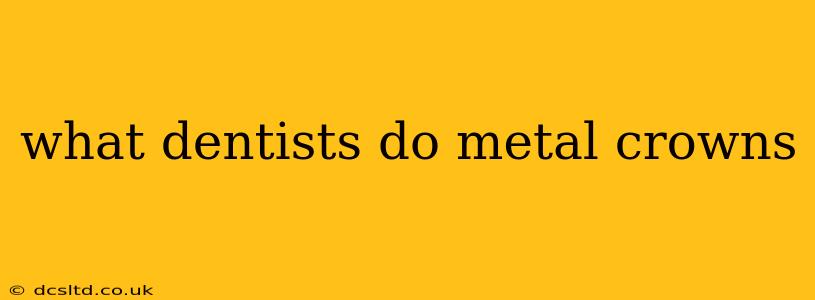Metal crowns, typically made from alloys of gold, nickel, chromium, or other metals, are a durable and reliable restorative option for damaged or decayed teeth. But what exactly do dentists do with them? This comprehensive guide explains the process, benefits, and considerations surrounding metal crowns.
What are Metal Crowns Used For?
Metal crowns are versatile restorations used to address a variety of dental issues. They're a strong and long-lasting solution for:
- Protecting severely damaged teeth: Teeth with extensive decay, fractures, or large fillings that weaken the tooth structure often benefit from a crown. The crown acts as a protective cap, restoring the tooth's strength and shape.
- Covering teeth after root canal therapy: After a root canal, a tooth can become brittle. A metal crown provides essential protection and structural support.
- Improving the appearance of discolored teeth: While not aesthetically pleasing to all, metal crowns effectively cover discoloration that can't be addressed with other whitening methods.
- Supporting dental bridges: Metal crowns are frequently used as abutments (the anchor teeth) for dental bridges, providing stability and strength to the entire structure.
- Strengthening weakened teeth after trauma: Teeth damaged due to injury or accidents may require a crown to restore function and stability.
The Process of Getting a Metal Crown
The process generally involves several appointments:
- Examination and Preparation: The dentist will examine the affected tooth, assess the extent of damage, and discuss the treatment plan. X-rays are often taken to evaluate the tooth's root structure.
- Tooth Preparation: The dentist will remove decay and prepare the tooth by carefully shaping it to accommodate the crown. This typically involves removing a layer of enamel and dentin.
- Impression Taking: An impression of the prepared tooth is made using a putty-like material. This impression is sent to a dental lab to create the custom-made crown.
- Temporary Crown Placement: A temporary crown is placed to protect the prepared tooth until the permanent crown is ready.
- Permanent Crown Cementation: Once the custom-made crown is received from the lab, the dentist will remove the temporary crown, clean and prepare the tooth, and permanently cement the metal crown into place. The dentist will ensure a proper fit and bite.
- Post-Placement Check-ups: Follow-up appointments are scheduled to monitor the crown and ensure it's functioning correctly.
What are the Advantages of Metal Crowns?
- Durability and Strength: Metal crowns are exceptionally durable, able to withstand significant biting forces and lasting for many years.
- Cost-Effectiveness: Compared to porcelain or porcelain-fused-to-metal crowns, metal crowns are often more affordable.
- Resistance to Wear and Fracture: The metal material resists chipping and fracturing, making them a long-lasting option.
What are the Disadvantages of Metal Crowns?
- Appearance: The metallic appearance may not be aesthetically pleasing to some patients, particularly in highly visible areas of the mouth.
- Metal Sensitivity: In rare cases, some individuals may experience a metallic taste or sensitivity to certain metal alloys.
What Materials are Used in Metal Crowns?
Metal crowns are commonly made from:
- Gold alloys: High-gold alloys are biocompatible, durable, and resist corrosion.
- Base metal alloys: These alloys are typically composed of nickel, chromium, and other metals and are more cost-effective than gold alloys.
Are Metal Crowns Right For Me?
The suitability of metal crowns depends on individual needs and preferences. Factors such as the extent of tooth damage, the patient's budget, and aesthetic concerns all play a role in determining the best restorative option. A consultation with a dentist is crucial to determine the most appropriate treatment plan.
How Long Do Metal Crowns Last?
With proper oral hygiene and regular dental checkups, metal crowns can last for 10-15 years or even longer. The lifespan can vary depending on factors like the patient's oral habits, the quality of the crown, and the overall health of the tooth.
How Much Do Metal Crowns Cost?
The cost of metal crowns varies depending on several factors, including the materials used, the dentist's fees, and geographic location. It is best to contact your dentist to get a personalized quote.
This comprehensive guide provides a detailed understanding of metal crowns, addressing many common questions and concerns. Remember to always consult with your dentist to discuss your specific needs and determine the best course of treatment for your dental health.
